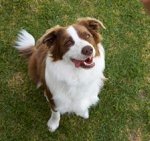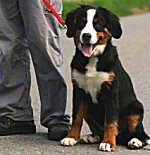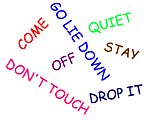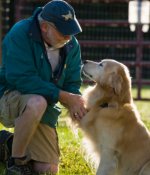Skye Terriers: What's Good About 'Em, What's Bad About 'Em
Skye Terrier temperament, personality, training, behavior, pros and cons, advice, and information, by Michele Welton, Dog Trainer, Behavioral Consultant, Author of 15 Dog Books
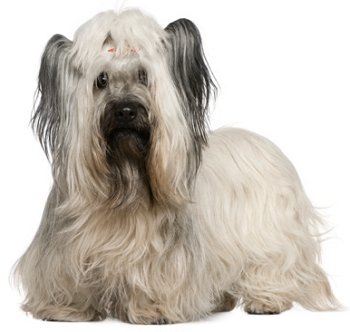
The Skye Terrier is more serious, more dignified, and more introspective than most terriers. Though stylish, he is also heavier and more powerful than you might imagine from just seeing a photo.
One of the few terriers who is laid-back indoors, the Skye Terrier is easy to exercise, requiring only walks and play sessions. However, he is a fearless, agile chaser with lightning reflexes and should never be let-off leash unless in a safe, enclosed area.
Intensely loyal to his family (sometimes attaching himself to one person), the Skye Terrier needs a lot of personal attention – he cannot be ignored.
Skye Terriers are cautious with strangers and should be extensively socialized when young so their wariness does not become suspicion.
They are dominant with other dogs and should not be trusted around smaller animals such as cats, rabbits, and rodents.
Likewise, the Skye Terrier can be dominant with family members who are wishy-washy. Skyes have great depth of character and prefer to make their own decisions, but they will respect an owner with an equally strong character and a firm voice who knows how to lead a proud, strong-minded dog.
Skyes do not suffer fools gladly. They are highly sensitive to correction and likely to retaliate if handled harshly or teased.
If you want a dog who...
- Is a "big dog with short legs" i.e. built low to the ground, but with a robust body, heavy bone, and a strong temperament
- Is an unusual-looking terrier – powerful yet stylish and elegant – with a long flowing coat
- Can be vigorous and athletic, but is also calmer, more serious, and more introspective than most terriers
- Needs only moderate exercise
- Makes a determined watchdog
A Skye Terrier may be right for you.
If you don't want to deal with...
- One of the most self-willed and independent of the terriers
- Suspiciousness/sharpness toward strangers in some lines, or when not socialized enough
- Aggression toward other animals – chasing instincts
- High coat maintenance (brushing or trimming)
- Waiting lists (very hard to find) and a high price tag
A Skye Terrier may not be right for you.
 |
Dog Breed Traits – Which Traits Are Right For You? In this brand new series, I'll help you decide which dog breed traits would best suit you and your family, your home and yard, and your lifestyle, so you can choose the best dog breed for your family. |
Keep in mind that the inheritance of temperament is less predictable than the inheritance of physical traits such as size or shedding. Temperament and behavior are also shaped by raising and training.
FREE eBooks by Michele Welton
![]() "Respect Training for Puppies" and "Teach Your Dog 100 English Words" are free step by step guides to teaching your pup to be calm and well-behaved.
"Respect Training for Puppies" and "Teach Your Dog 100 English Words" are free step by step guides to teaching your pup to be calm and well-behaved.
![]() "11 Things You Must Do Right To Keep Your Dog Healthy and Happy" is a free guide to keeping your dog mentally, physically, and emotionally happy and healthy so you can enjoy a longer lifetime of companionship.
"11 Things You Must Do Right To Keep Your Dog Healthy and Happy" is a free guide to keeping your dog mentally, physically, and emotionally happy and healthy so you can enjoy a longer lifetime of companionship.

More traits and characteristics of the Skye Terrier
If I was considering a Skye Terrier, I would be most concerned about...
- Strong mind of their own. Skye Terriers can be headstrong and must be taught at an early age that they are not the rulers of the world. The toughness that makes them suited to killing vermin can frustrate you when you try to teach them anything. You must show them, through absolute consistency, that you mean what you say.
In other words, you must teach your Skye Terrier to respect you. A dog who respects you will do what you say and will stop what he's doing when you tell him "No." Follow my free online training programs.
- Sharpness toward strangers. Standoffish by nature, Skye Terriers need extensive exposure to people and to unusual sights and sounds. Otherwise their natural caution can become extreme wariness or suspiciousness, which can lead to biting. The Skye Terrier has powerful jaws and is not a dog to be trifled with.
- Defensive reactions. I do not recommend terriers for small children. Many terriers will not tolerate any nonsense from little life forms whom they consider to be below themselves in importance. Many terriers are quick to react to teasing, and even to the normal clumsiness that comes with small children (accidental squeezing of their ears or pulling of whiskers or stepping on their paw). Many terriers are possessive of their food and toys and will defend these from all comers, including children.
- Animal aggression. Like all terriers, Skyes can be scrappy with other dogs of the same sex. They are a determined force to reckon with if they decide to initiate or accept a challenge to fight. And because of their hunting background, most Skye Terriers have strong instincts to chase and seize small fleeing creatures. This can make for conflict if you own a cat. It may be much worse than that if you own a pet rabbit or hamster!
- Grooming. Without frequent brushing, Skye Terriers become a matted mess. If you can't commit to the brushing, you have to commit to frequent trimming to keep the coat short and sanitary.
- Finding one. In the United States, fewer than 100 new Skye Terrier puppies are registered each year, so you should expect to go on a waiting list.
My best-selling books – now available FREE on my website
 Respect Training For Puppies: 30 seconds to a calm, polite, well-behaved puppy is for puppies 2 to 18 months old. Your puppy will learn the 21 skills that all family dogs need to know. Click here to read for free.
Respect Training For Puppies: 30 seconds to a calm, polite, well-behaved puppy is for puppies 2 to 18 months old. Your puppy will learn the 21 skills that all family dogs need to know. Click here to read for free. Teach Your Dog 100 English Words is a unique Vocabulary and Respect Training Program that will teach your adult dog to listen to you and do what you say. Click here to read for free.
Teach Your Dog 100 English Words is a unique Vocabulary and Respect Training Program that will teach your adult dog to listen to you and do what you say. Click here to read for free. 11 Things You Must Do Right To Keep Your Dog Healthy and Happy helps your dog live a longer, healthier life. Get my honest advice about all 11 Things before you bring home your new puppy, because some mistakes with early health care cannot be undone. Click here to read for free.
11 Things You Must Do Right To Keep Your Dog Healthy and Happy helps your dog live a longer, healthier life. Get my honest advice about all 11 Things before you bring home your new puppy, because some mistakes with early health care cannot be undone. Click here to read for free.Related posts you might enjoy



